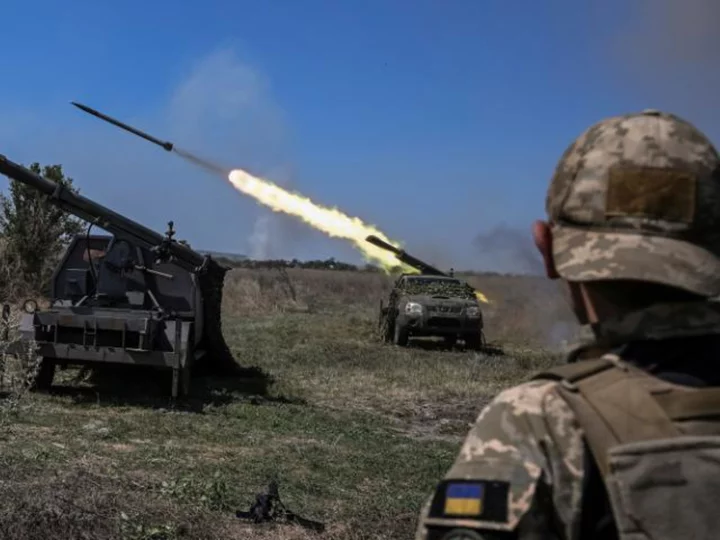The Ukrainian missile attack on the headquarters of the Russian Black Sea Fleet is perhaps the most dramatic example yet of the confidence with which Ukraine is going after Russian facilities in occupied Crimea -- and the vulnerability of critically important infrastructure on the peninsula.
In short order, the Ukrainians have hit a Russian military airfield at Saky, degraded Russian air defenses on the north-west coast (including taking out an S-400 missile defense complex), and carried out a missile attack on the main dry-dock and ship-repair facility in Sevastopol, crippling an attack submarine and a landing ship.
The attack on Saky on Thursday caused unspecified but "serious damage" at the airfield, according to sources in Ukraine's Security Services (SBU).
On Wednesday, a large plume of smoke rose from a naval base near Sevastopol. Local authorities played down the incident, saying that a number of drones were brought down. But the Ukrainian military says it successfully hit a Russian command post near Verkhniosadove, a few kilometers from Sevastopol.
The Institute for the Study of War (ISW) noted that satellite imagery confirmed that Ukrainian forces "struck the 744th Communications Center of the Command of the Black Sea Fleet... as part of an apparent Ukrainian effort to target Black Sea Fleet facilities."
Russia's Ministry of Defense said a Russian soldier was missing after Friday's missile attack on the headquarters of the Black Sea Fleet in Sevastopol.
"While repelling a missile attack, five missiles were shot down by air defense systems. As a result of the attack, the historical headquarters building of the Black Sea Fleet was damaged," the ministry said.
Ukrainian Defense Intelligence spokesperson Andrii Yusov said Russia was using Crimea as a "logistics hub" and that "the ultimate goal, of course, is the de-occupation of Ukrainian Crimea."
Last month, Ukraine's special forces carried out a commando raid on the Crimean coast. The seizure earlier this month of oil platforms in the Black Sea by Ukrainian commandos has given them another jumping-off point and affected the Russian Black Sea fleet's freedom of navigation.
The platforms, known as the Boyko Towers, had been controlled by Russia since soon after Moscow annexed the Crimean peninsula in 2014.
There are plenty of reasons for Ukraine to target Crimea. It's politically a sign that despite the slow progress on the front lines in its counteroffensive, Ukraine can still inflict serious damage on the Russian military. Targets such as the Crimea bridge have considerable symbolic value as well as strategic purpose.
It's also part of a broader effort -- in Crimea, Zaporizhzhia, Donetsk and Luhansk -- to hit Russian logistics, fuel, maintenance and command centers, in order to disrupt their ability to supply the front lines.
The Russian Black Sea Fleet has been involved in hundreds of cruise missile attacks against Ukraine and threatens merchant shipping using Ukrainian ports. Any disruption to its operation and command facilities (as well as the targeting of vessels at sea and in dock) is a win, especially after the Russian withdrawal from the Black Sea Grain Initiative in July. And, this week, the Ukrainians went after a drone facility in Crimea. Russia has used drones to target Ukraine's Danube River ports.
Ukraine has devoted considerable effort to degrading Russian air defenses in Crimea. That effort now appears to be paying off -- as Ukrainian Neptune missiles (and most probably UK-provided Storm Shadows) are capable of reaching targets deep inside Crimea.
The Ukrainians appear also to have rejected or ignored criticism from some US officials of their concentration on Crimea. One unnamed senior US defense official told CNN recently that "it's knocked the Russians off balance a bit, but it is not doing anything decisive... And it would probably be better for everyone for them to just focus on the counteroffensive."
The Ukrainians argue with some justification that targeting anything to do with the Black Sea Fleet is worthwhile. As the ISW noted Thursday, "elements of the Black Sea Fleet's 810th Naval Infantry Brigade are engaged in critical defensive operations in western Zaporizhzhia Oblast, and the Black Sea Fleet's 22nd Army Corps is defending positions on the east bank of Kherson Oblast."
It's worth remembering that the Black Sea Fleet's control of the Saky airfield gives it charge of ground-based aircraft in addition to its naval-based assets.
The Black Sea Fleet is still a powerful element of Russia's offensive capability, but becoming less so by the week.
"The Black Sea Fleet is more than its naval assets, and the Ukrainian attacks on the Black Sea Fleet will likely achieve effects beyond the degradation of Russian naval capabilities," concludes the ISW.









